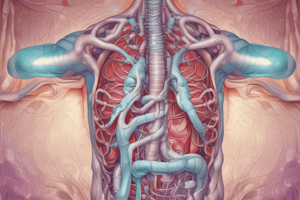Podcast
Questions and Answers
What is the maximum volume of air that can be inspired after a normal tidal expiration?
What is the maximum volume of air that can be inspired after a normal tidal expiration?
- Inspiratory capacity (IC) (correct)
- Total lung capacity (TLC)
- Residual volume (RV)
- Expiratory capacity (EC)
Which lung capacity is calculated by the sum of tidal volume (TV), inspiratory reserve volume (IRV), and expiratory reserve volume (ERV)?
Which lung capacity is calculated by the sum of tidal volume (TV), inspiratory reserve volume (IRV), and expiratory reserve volume (ERV)?
- Total lung capacity (TLC)
- Residual capacity (RC)
- Vital capacity (VC) (correct)
- Expiratory capacity (EC)
What factor does not affect vital capacity (VC)?
What factor does not affect vital capacity (VC)?
- Height of the individual (correct)
- Age
- Strength of respiratory muscles
- Gravity
How is total lung capacity (TLC) calculated?
How is total lung capacity (TLC) calculated?
What does a spirometer measure?
What does a spirometer measure?
What is the primary unit of measurement for tidal volume in a healthy adult during quiet breathing?
What is the primary unit of measurement for tidal volume in a healthy adult during quiet breathing?
Which lung volume represents the amount of air that can be forcibly exhaled after a normal exhalation?
Which lung volume represents the amount of air that can be forcibly exhaled after a normal exhalation?
What term describes the total volume of air that can be forcibly inhaled beyond the tidal volume?
What term describes the total volume of air that can be forcibly inhaled beyond the tidal volume?
Which volume remains in the lungs after the most forceful expiration?
Which volume remains in the lungs after the most forceful expiration?
How do pressure gradients affect pulmonary ventilation?
How do pressure gradients affect pulmonary ventilation?
Which factor can significantly impact lung volumes and capacities?
Which factor can significantly impact lung volumes and capacities?
What is the approximate volume of the inspiratory reserve volume for males?
What is the approximate volume of the inspiratory reserve volume for males?
What process involves the diffusion of gases between the lungs and the bloodstream?
What process involves the diffusion of gases between the lungs and the bloodstream?
Flashcards are hidden until you start studying
Study Notes
Respiratory Process
- Respiration involves three steps: pulmonary ventilation, gas exchange, and gas transport.
- Pulmonary ventilation is the physical movement of air into and out of the lungs.
- Gas exchange is the diffusion of gases between the air in the lungs and the blood in the alveoli (external respiration) and between the blood and other tissues (internal respiration).
- Gas transport is the transport of oxygen and carbon dioxide in the blood between the alveolar capillaries and the capillary beds in other tissues.
Respiratory Volumes
- The maximum volume a lung can expand is divided into four non-overlapping volumes: tidal volume, inspiratory reserve volume, expiratory reserve volume, and residual volume.
- Tidal volume (TV) is the normal volume of air inspired or expired during normal quiet breathing.
- Inspiratory reserve volume (IRV) is the extra volume of air that can be inhaled by a maximum inspiratory effort.
- Expiratory reserve volume (ERV) is the extra volume of air that can be exhaled by a maximum forceful expiration.
- Residual volume (RV) is the volume of air that remains in the lungs after the most forceful expiration.
Respiratory Capacities
- Lung capacities are combinations of two or more lung volumes.
- Inspiratory capacity (IC) is the maximum volume of air that can be inspired after normal tidal expiration.
- Expiratory capacity (EC) is the maximum volume of air that can be expired after normal tidal inspiration.
- Vital capacity (VC) is the maximum volume of air that a person can expel after the deepest possible inspiration.
- Total lung capacity (TLC) is the volume of air present in the lungs after maximal inspiration.
Spirometer
- Measures the rate at which the lung changes volume.
Studying That Suits You
Use AI to generate personalized quizzes and flashcards to suit your learning preferences.




